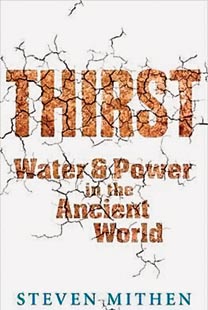 Scholars who mine the past for information always do so in the light of contemporary concerns. Throughout Thirst, Mithen, an eminent archaeologist at the U.K.’s University of Reading, is attuned to the massive floods and severe droughts the world is experiencing today. Climate change has wrecked entire civilizations before: when the water loses its steady, life-enabling flow—when there’s too much or too little, for too long—things fall apart.
Scholars who mine the past for information always do so in the light of contemporary concerns. Throughout Thirst, Mithen, an eminent archaeologist at the U.K.’s University of Reading, is attuned to the massive floods and severe droughts the world is experiencing today. Climate change has wrecked entire civilizations before: when the water loses its steady, life-enabling flow—when there’s too much or too little, for too long—things fall apart.
Mithen’s thoughts on the imminent future of Peru—where Inca hydraulic engineers once constructed an irrigation and drainage system at Machu Picchu that still dazzles modern experts—are convincingly gloomy. The mountain glaciers that provided the Incas with their meltwater are retreating at the rate of 60 m or more a year, and scientists expect every glacier below 5,500 m to be gone by 2015. Modern Lima’s 10 million people are equally dependent on that meltwater, and “how they will cope remains unclear,” writes Mithen. Further stressing diminished supplies is a need the ancients never experienced—water for hydro power—and a danger they were all too familiar with: poison. Irrigate for too long, long-ago Sumerians found, and water-borne salts will start to choke the fields; in contemporary Peru, mining operations are leaching toxins into the water that sustains agriculture. Competing water users are starting to face off, and some clashes have turned violent.
Mithen’s survey of the hydraulic wonders achieved by ancient civilizations from Peru to Cambodia was written with all that in mind. Does the collapse of those cultures, due partly to forces beyond their control (changing rainfall) and partly to their own errors (deforestation), predict the future of our own water crisis, only on a far vaster scale? Maybe, muses the sober-minded archaeologist. Growing populations forced those cultures to increase their water use to unsustainable levels—to the point where there was no give in the system when the climate changed. The more complex their water management became, the more the civilizations grew autocratic. Moderns, however, know what went wrong: should we summon the will, Mithen writes, we can avoid their fate.